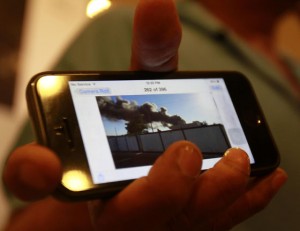More than 11,000 Filipinos in Libya have refused to heed the Philippine government’s call for them to leave the war-torn country, choosing to take their chances despite the worsening civil turmoil there, the Department of Foreign Affairs (DFA) said on Monday.
DFA spokesperson Charles Jose said only about 1,000 Filipinos signed up for repatriation. Of this number, 800 have been sent home and the rest are waiting their turn at the Philippine Embassy in Tripoli.
The department raised alert level 4, calling for mandatory repatriation, on July 20, after a Filipino was beheaded in Libya for being a Christian.
Libya’s relatively young government and weak military have been unable to control rival militias that have been fighting for nearly a month.
Western countries, including the United States, have evacuated their embassies because of the violent clashes in Tripoli and the eastern city of Benghazi.
There is fear that Libya may be sliding back to a civil war, which was likened to the aftermath of the fall of longtime ruler Mu ammar Gaddafi.
Most Filipinos who work in the country are professionals in big companies in the oil industry, construction and medical services.
”Many of the Filipinos remaining in Libya think they will survive the conflict, but they are less sure they will survive if they don’t find jobs back here,” Jose said.
He said the department cannot physically force Filipino holdouts if they do not want to leave.
The DFA has evacuated non-essential and female staff from the Philippine Embassy in Tripoli to Tunisia, leaving only the male staff and the rapid response team to carry out the repatriation.
Bishop Broderick Pabillo, auxiliary bishop of the Archdiocese of Manila and Chair of the Episcopal Commission on Social Action, Justice and Peace of the Catholic Bishops’ Conference of the Philippines said most Filipinos in Libya decided to stay because there are no jobs waiting for them in the country.
Pabillo said government should immediately offer a job to repatriated OFWs.
He said the same thing happened when Filipino workers in Lebanon were told to come home but no employment were offered them.


